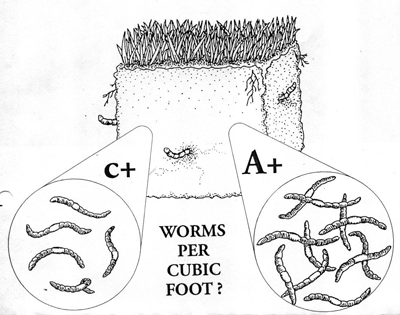In many files in Yardener’s Helper, we recommend doing everything you can to encourage earthworms to live in the soil of your home landscape. While they do lots of good things for the soil, their greatest role is as a major producer of natural fertilizer. Your earthworms produce their weight in castings every day, and worm castings are an absolutely wonderful fertilizer, with nutrients available in a form all plants can use. In a 200-square-foot area of lawn for example, with a density of only five worms per cubic foot (considered a low population), your earthworms will give you over 35 pounds (about 1/3 pound per worm) of top-grade fertilizer during each year. They not only produce this valuable fertilizer, they also spread it evenly throughout the top 12 inches of soil, and in many cases they will go much deeper, sometimes as far down as 6 feet.
 |
A well-managed soil rich in humus can easily support 25 worms per cubic foot, which, in that same 200-square-foot of lawn , means at least 175 pounds of fertilizer! This fertilizer contains the key plant nutrients nitrogen, phosphorus, and potassium, plus many of the essential micronutrients plants need to grow and remain healthy. Dead earthworms are also very rich in nitrogen. This file will encourage you to pay attention to the earthworm population on your property; they will save you much time and money in the long term.
Some Lawn Fertilizers Chase Earthworms
One reason not to use dry or granular fast-acting nitrogen fertilizers in your yard is that they repel earthworms. As the nitrogen in these fertilizers becomes soluble and leaches down into the soil, it force the earthworms to seek refuge someplace else. Why put 10 or 20 pounds of fast-acting nitrogen fertilizer on to your lawn and repel a source of over 100 pounds of superior fertilizer?

